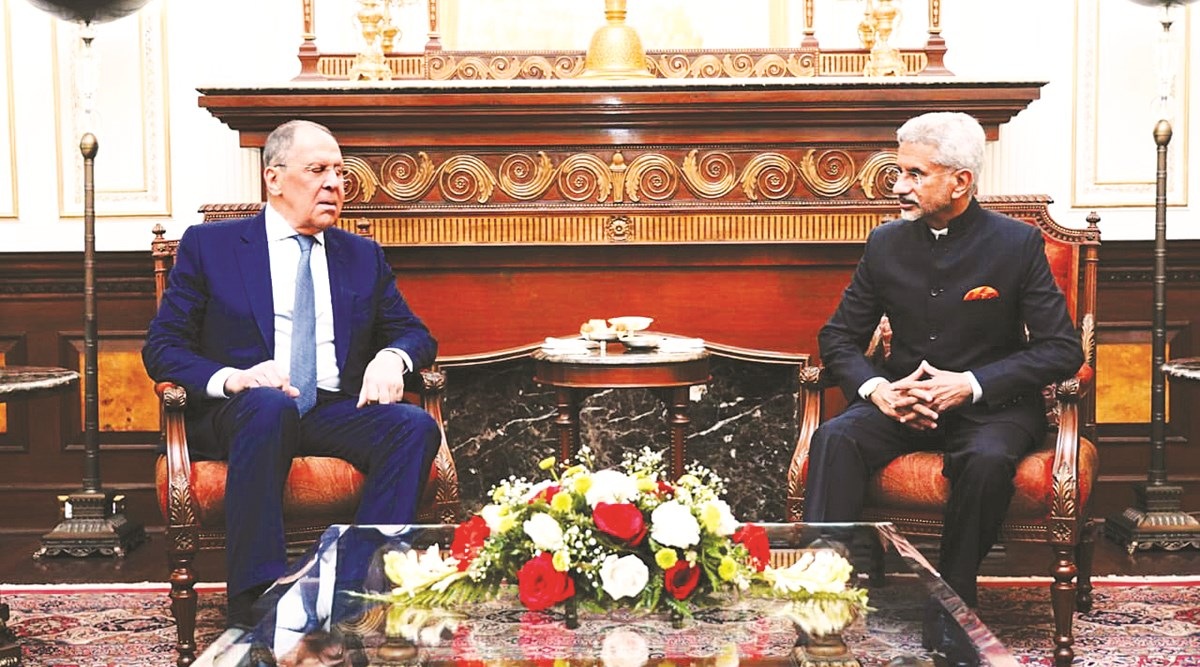 Foreign Ministers Sergey Lavrov and S Jaishankar during Lavrov’s India visit. (File)
Foreign Ministers Sergey Lavrov and S Jaishankar during Lavrov’s India visit. (File) In his ruminations on India’s engagement with the world, External Affairs Minister S Jaishankar states, “India must reach out in as many directions as possible and maximise its gains. This is not just about greater ambition; it is also about not living in yesterday.” (p.42, The India Way). Today, as he advises PM Modi in crafting policy to protect India’s interests in the wake of Russia’s invasion of Ukraine, Jaishankar would feel himself surrounded by the echoes of the past six-and-a-half decades. Indian positions and statements on Russia’s predecessor state, the Soviet Union, and its armed interventions — euphemisms for invasions — in Hungary (1956), Czechoslovakia (1968), Afghanistan (1979) are largely similar to its current, albeit evolving, stand on Russia’s action. On the other hand, India’s responses to the Israeli-British-French invasion of Egypt (1956), the long years of the US’s armed involvement in Vietnam and its Iraq war (2003) followed a different trajectory.
The unfolding of India’s stand on the Russian invasion of Ukraine is best illustrated by its statements at the UNSC. While it has refrained from any direct criticism of Russia and abstained from voting in any resolutions against it, India has dropped any reference to security concerns of states. It now focuses on the need to abide by the UN Charter, respect sovereignty and territorial integrity of states and to resolve issues through dialogue and negotiations.
Russia is happy with India’s abstentions, for that is important for perceptions, but it would have noted the shift in India’s position. Jaishankar said in Parliament on April 6: “If India has chosen a side, it is the side of peace and it is for an immediate end to violence.” This is of course ‘motherhood and apple pie’, but Jaishankar would be aware that it was Jawaharlal Nehru who was called shantidoot, the messenger of peace. The past creeps in, if subconsciously!
India’s 1956 predicament lay inter alia in deciding its approaches to two separate crises. One sprang from the British and French reaction to Egyptian President Gamal Abdel Nasser’s decision in July 1956 to nationalise the Suez Canal. Till then, the canal was controlled by an Anglo-French company. After a period of desultory talks, both countries, along with Israel, decided to launch a war against Egypt in October. India was outraged by this action of the colonial powers. Nehru condemned the action and remained in contact with the US, which insisted that its allies — Britain, France and Israel — withdraw their forces. They did so but not before the UN General Assembly too sought the same and the US threatened Britain with destabilising its currency.
The Hungarian crisis came to a boil at the same time as Egypt was being invaded. A strong section of the Hungarian political class supported by students and others sought to break away from Soviet domination. It wanted to chart its own socialist path and withdrew from the Warsaw pact. The situation was confused in what became a general uprising. Ultimately, the Soviet Union invaded Hungary and the anti-Soviet forces were brutally suppressed. Unlike his position on Egypt, Nehru initially did not openly speak against the Soviets. The Indian representative abstained in a UNGA motion which was critical of Soviets. Public opinion in India was unhappy with Soviet action and criticised Nehru, who belatedly and publicly acknowledged Hungary’s desire for autonomy despite Soviet threats of diluting their support on the J&K issue which then was an active matter in the UNSC.
Twelve years later, beginning January 1968, Czechoslovakia witnessed a period of socialist liberalisation under a reformist leader. The Soviet Union with other Warsaw Pact nations finally decided that they could not allow this deviation from the accepted Soviet model. Hence, in August 1968, their armies invaded Czechoslovakia. Resistance was limited and the country’s political elite came to heel. The Soviet-led action was criticised in India. Prime Minister Indira Gandhi was sympathetic to the plight of Czechs but refused to be swayed by emotion. India abstained from voting on a resolution at the UNSC seeking to condemn the Soviet Union.
In 1979, Soviets invaded Afghanistan. Gandhi returned to power a few days after that. India supported the Soviets at the UNGA. It blamed outside powers for interfering in Afghan affairs, accepted that Soviet forces had entered at Afghan request and India had been assured that they would leave whenever Afghans wanted them to. The Soviet occupation went on for a decade. Through this period, India was unhappy with the Soviet presence but it never really publicly embarrassed it, though privately it advised them to leave Afghanistan.
The Vietnam war was one of the defining struggles of Cold War, which India viewed in anti-colonial and ideological terms. Its sympathies lay with the North, especially after US combat troops arrived in the South in 1965. US armed action, often brutal, using weapons such as napalm bombs, outraged public opinion in India and the government did not restrain it, nor did it cushion its antipathy towards US actions.
The 2003 US invasion of Iraq was based on false premises. The government expressed anguish and Parliament deplored it. India also refused a US request to send peace-keeping forces to the country. These were wise decisions and did not impact the growth of India-US ties.
Despite this government’s full antipathy for Nehru and only a little less for his daughter, in responding to the current Ukraine situation, it is following the matrix set by them.
(The writer is a former diplomat)
- The Indian Express website has been rated GREEN for its credibility and trustworthiness by Newsguard, a global service that rates news sources for their journalistic standards.

